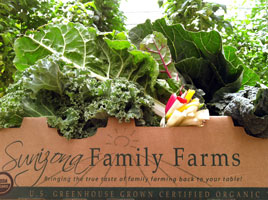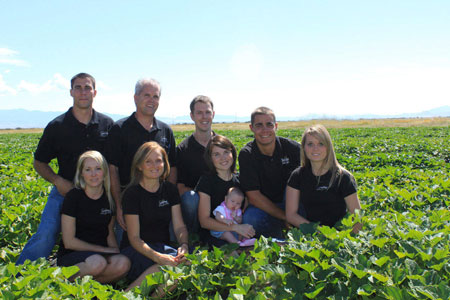7/26/2013
Growing "Veganically" at Sunizona Family Farms
Annie White
Veganically Grown: ve▪gan▪ic: organic + more (ve-gan-ik)
Think of it as vegan-organic, meaning certified organic growing that’s free from the use of animal products (manures, blood, bone or fish meals, etc.) and uses strictly plant-based materials for fertilization.
“Veganic” is the big buzzword at Sunizona Family Farms.
“Think of it as vegan-organic, meaning certified organic growing that’s free from the use of animal products, such as manures, blood, bone or fish meals, and uses strictly plant-based materials,” explains Byron Smith, who runs the family-owned business with his wife Janice and their children.
A FarmBox from Sunizona Family Farms filled with veganically grown veggies.
filled with veganically grown veggies.
By pioneering their unique vegan-organic growing system, Sunizona is upping the ante for sustainable, ethical and healthful food production and has created a strong niche market for their growing business. While visiting Sunizona Family Farms last April, I talked with the energetic and innovative farmers themselves about their long and unique journey to growing veganically.
Greening the Arizona Desert
It all started back in 1996 when Byron and Janice moved to Willcox, Arizona from northern British Columbia with their family. They were looking for a quiet country location to raise their four children and start an agricultural business their whole family could be involved in, including Byron’s parents. They settled on the small community of Willcox in the southeastern part of the state. Located 80 miles east of the city of Tucson and 80 miles north of the border of Mexico, Willcox is rich with history, ranching, agriculture and, most importantly, sunshine.
The Smiths purchased 300 acres of farmland in Willcox—a perfectly blank slate to grow their farm and their family. On the eastern edge of the Sonoran Desert, the relatively high elevation (4,300 ft. above sea level) offers a mild, year-round climate for growing veggies. (Willcox is also home to greenhouse tomato giant, Eurofresh Farms, now under the ownership of NatureSweet.)
The family began their new agricultural venture growing conventional greenhouse long-English cucumbers and selling their produce to distributors across North America. Motivated to both live and operate their business more sustainably, the family started to shake things up in 2002.
Sun izona Family Farms is truly a family-run business. Byron and Janice Smith (second from the left) pose with their family in their Arizona farm field.
izona Family Farms is truly a family-run business. Byron and Janice Smith (second from the left) pose with their family in their Arizona farm field.
Choosing a more sustainable path
After six years in operation, the Smiths began shifting their focus from growing for large distributors to growing for a more local market. They diversified their crops, switching from predominantly cucumber production to predominantly tomatoes, microgreens, salad greens and herbs. They replaced their natural gas heating system with a biomass boiler system, which allows them to burn local waste pecan shells for heat. The pecan shells are pelletized on their farm before being burned in the boiler.
“Not only is it better for the environment because we are no longer relying solely on fossil fuels for heating our greenhouses, but we are also using a local waste that in the burning process doesn’t release any more carbon dioxide into the environment than if it were to decompose naturally,” explains Byron.
Next, Sunizona wanted to make the switch from using chemical-based fertilizers to organic growing. They replaced their soilless hydroponic substrates with an organic potting soil that they made themselves from local materials, including their composted plant waste and local pecan shells. Sunizona became a certified organic farm in 2009.
Going beyond organic
Earning their organic certification was just another step towards the Smiths bigger and more ambitious goal of “veganic” growing. They were concerned about the environmental impact and animal cruelty implications of using animal products, such as blood, bone and fish meals and animal manures in fertilizers. Organic farmers are allowed to use these forms of fertilizers, but the Smiths believe there’s a loophole in the National Organic Program (NOP). The NOP allows animal products to be taken from conventional farms, including factory farms, feedlots and processing plants. Hormones, antibiotics and heavy metals that are used in these conventional farms can then be transferred to organic farms through the animal-based fertilizers.
After years of research, the Smiths developed a unique vegan-organic growing system that uses strictly plant-based materials for fertilizing, and is free from the use of animal products, thus preventing antibiotics, hormones, heavy metals and other contaminants from getting into the food and into the environment.
To meet the company’s growing demand for veganic fertilizer, Byron makes his own using local waste products such as alfalfa, beans, peanut meal and wheat. These products are mixed in a fertilizer pellet machine to produce a dry, pelletized plant-based fertilizer with an NPK analysis of 5-1-2. They also sell small 4-lb. and 30-lb. bags of the veganic fertilizer through their website.
Increasing food options, reducing food miles
Today, Sunizona actively farms about 20 of their 300 acres. They grow about 25 varieties of tomatoes in their 1.5-acre greenhouse alongside a smaller assortment of greenhouse cucumbers, peppers, beans, peas, greens and more. They also have a 10,000 sq. ft. specialty greenhouse where they grow individual varieties of microgreens and herbs, as well as mixed salad greens. They use hoop houses to extend the season for field crops, such as kale and spinach, and grow summer crops of melons, squash and strawberries out under the sunny Arizona sky.
The Smiths estimate that 99% of their produce is now sold and consumed in the state of Arizona. Sunizona’s products are available at all Whole Foods Markets and AJ’s Fine Foods in Arizona, as well as some local farmers markets and restaurants. The majority of their produce (about 60%) is sold directly from the farm to customers through their FarmBox program.
Sunizona’s FarmBox program is a CSA-style service where members pay a weekly fee to have a selection of fresh produce delivered to a pick-up location in their area. Many of the pick-up spots are in the Tucson and Phoenix areas. Subscribers can pay $22 for a small box or $30 for a large box of produce each week, which will contain seven to nine or nine to 12 varieties of veganically grown produce.
Customers also have the option to create a custom FarmBox by selecting available produce a la carte from Sunizona’s online farm store. In early July, Sunizona had about 33 fresh veggie varieties available for purchase online, 22 microgreen and herb varieties, and an assortment of vegan baked goods from Grandma Smith. An online shopper can pick up a pound of red and yellow cocktail tomatoes for $3.75, a bunch of curly kale for $2.75, a 4-oz. container of mixed microgreens, branded as a “petite power salad” for $4.00 and a loaf of Grandma’s sprouted spelt bread for $5.00.
With their veganic growing operation now well established, the Smith family is enjoying the satisfaction of living their passion.
“This was a dream that we had been looking forward to fulfilling for a long time,” explains the Smith family on their website. “We can truly say that we love living in Arizona and it is home to us. We are proud to share our homegrown produce with our neighbors across Arizona and are thankful to have a superb close-knit extended family of employees who make our family business a successful and fun place to work.”
To learn more about growing vegan-organic, visit veganicallygrown.com, a website created by Sunizona Family Farms. Also check out the Veganic Agriculture Network’s website, goveganic.net, for news, events and a directory of other veganic farms in North America.
GT